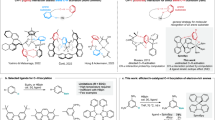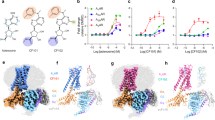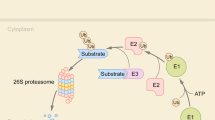Abstract
As pointed out by Mellander1, organic phosphoryl compounds derived from phosphoproteins may behave as effective chelating agents and therefore may be of great biological importance. For the study of the chelating ability of such compounds, synthetic model substances of similar structure are under investigation. Apparent ionization constants of synthetic O-phosphoserine,  and apparent stability constants of some metal complexes of that compound have been examined.
and apparent stability constants of some metal complexes of that compound have been examined.
This is a preview of subscription content, access via your institution
Access options
Subscribe to this journal
Receive 51 print issues and online access
$199.00 per year
only $3.90 per issue
Buy this article
- Purchase on Springer Link
- Instant access to full article PDF
Prices may be subject to local taxes which are calculated during checkout
Similar content being viewed by others
References
Mellander, O., Nutrition Reviews, 13, 161 (1955).
Canali, V., Casciotti, G., De Luca, R., and Baldantoni, A., Boll. Soc. Ital. Biol. Sper., 27, 1479 (1951).
Bjerrum, J., “Metal Amine Formation in Aqueous Solution” (P. Haase and Sons, Copenhagen, 1941).
Author information
Authors and Affiliations
Rights and permissions
About this article
Cite this article
ÖSTERBERG, R. Metal and Hydrogen-Ion Binding Properties of O-Phosphoserine. Nature 179, 476–477 (1957). https://doi.org/10.1038/179476a0
Issue Date:
DOI: https://doi.org/10.1038/179476a0
This article is cited by
-
Determination of Protonation Constants of O-Phospho-l-serine in Aqueous Solution: Potentiometry, Microcalorimetry, NMR Spectroscopy and Quantum Chemical Calculations
Journal of Solution Chemistry (2017)
-
On the state of anionic groups of demineralized matrices of bone and dentine
Calcified Tissue Research (1977)
Comments
By submitting a comment you agree to abide by our Terms and Community Guidelines. If you find something abusive or that does not comply with our terms or guidelines please flag it as inappropriate.



